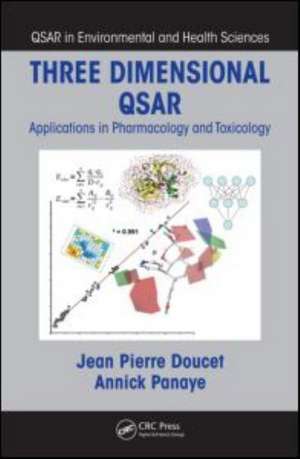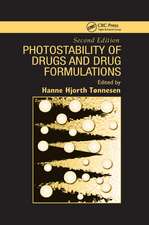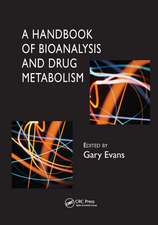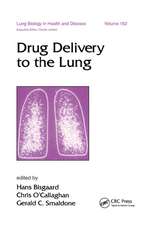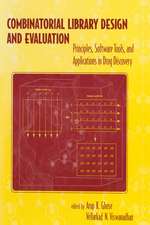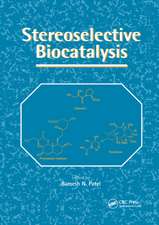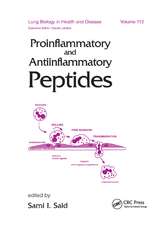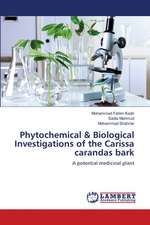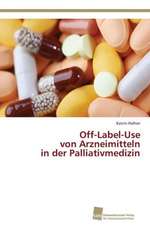Three Dimensional QSAR: Applications in Pharmacology and Toxicology: QSAR in Environmental and Health Sciences
Autor Jean Pierre Doucet, Annick Panayeen Limba Engleză Hardback – 17 dec 2010
Part I
The first part of the book addresses CoMFA and related methods, such as CoMSIA, FLUFF, SOMFA. It also describes shape-, surface-, and volume-based approaches, including MSA, excluded volume, LIV, HASL, receptor surface model, COMPASS, and CoMSA.
Part II
Focusing on methods that use 3D information, the second part covers autocorrelation methods, such as GRIND; similarity-based methods, including similarity matrices and quantum similarity indices; and quantitative spectroscopic data–activity relationships. Some applications in data mining are also explored.
Part III
The third part deals with post-3D models. The authors discuss the adaptation of the receptor and simultaneous presence of several conformers or solvation mechanisms.
Part IV
The final part presents receptor-related approaches as well as docking and free energy calculations, which are treated at various levels. This part concerns the extensive sampling of phase space and approximate methods, such as linear interaction energy, Poisson–Boltzmann, and generalized Born models. A case study covering several parallel approaches is also developed.
An appendix offers the basic principles of modeling and statistical tools routinely required in QSAR methodologies, includi
| Toate formatele și edițiile | Preț | Express |
|---|---|---|
| Paperback (1) | 511.19 lei 6-8 săpt. | |
| CRC Press – 21 oct 2019 | 511.19 lei 6-8 săpt. | |
| Hardback (1) | 1626.31 lei 6-8 săpt. | |
| CRC Press – 17 dec 2010 | 1626.31 lei 6-8 săpt. |
Preț: 1626.31 lei
Preț vechi: 1983.30 lei
-18% Nou
Puncte Express: 2439
Preț estimativ în valută:
311.20€ • 332.77$ • 259.47£
311.20€ • 332.77$ • 259.47£
Carte tipărită la comandă
Livrare economică 18 aprilie-02 mai
Preluare comenzi: 021 569.72.76
Specificații
ISBN-13: 9781420091151
ISBN-10: 1420091158
Pagini: 576
Ilustrații: 8-Page Color Insert
Dimensiuni: 156 x 234 x 38 mm
Greutate: 1.23 kg
Ediția:1
Editura: CRC Press
Colecția CRC Press
Seria QSAR in Environmental and Health Sciences
Locul publicării:Boca Raton, United States
ISBN-10: 1420091158
Pagini: 576
Ilustrații: 8-Page Color Insert
Dimensiuni: 156 x 234 x 38 mm
Greutate: 1.23 kg
Ediția:1
Editura: CRC Press
Colecția CRC Press
Seria QSAR in Environmental and Health Sciences
Locul publicării:Boca Raton, United States
Public țintă
Academic and Professional Practice & DevelopmentCuprins
Actual 3D Models. Around the 3D Approaches. Beyond 3D. Receptor-Related Models. Concluding Remarks. Appendices. References. Index.
Notă biografică
Jean Pierre Doucet and Annick Panaye are both professors at Université Denis-Diderot, Paris, France. They have chaired several conferences and published numerous papers.
Descriere
With numerous examples and more than 1,000 references, this book presents the most recent QSAR methods and illustrates their scope, advantages, and limitations. It offers extended comparisons of 2.5D methods in which the 3D information is masked by data preprocessing and emphasizes the synergy of various aspects of chemoinformatics, including neural networks, genetic algorithms, support vector machines, data mining, and pharmacophore detection. The authors include actual calculations of the thermodynamic cycle and free energy perturbations. They also present the basic principles of molecular modeling methods and recent statistical/mathematical approaches.
